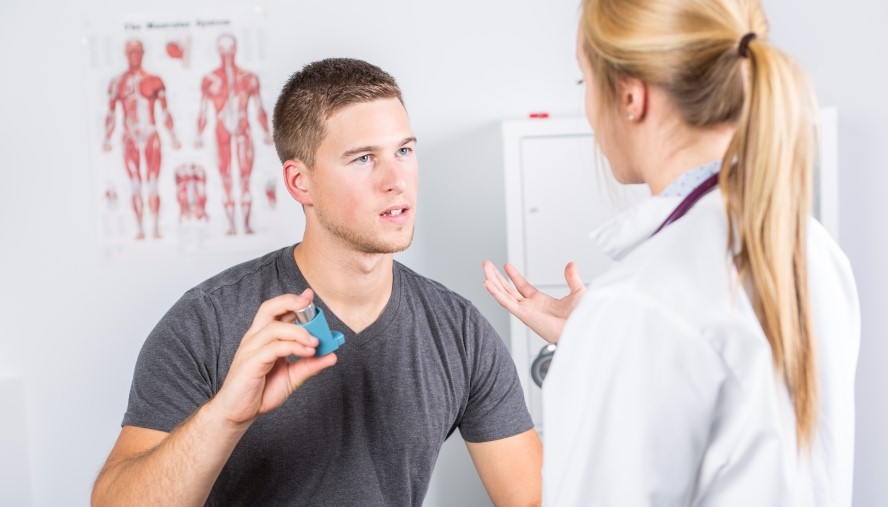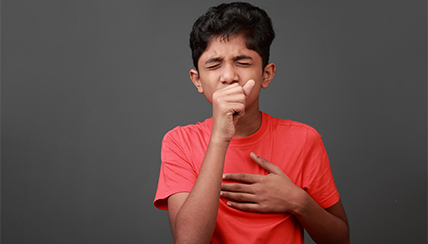Search Clinical Trials
Our researchers are currently in need of adult and pediatric study participants to help us pursue better treatments and cures. Participants may receive medical evaluations and procedures, study medication, disease-related education and possible financial compensation for time, travel and participation.
Select a Condition or Specialty
- Allergy
- Alpha-1 Antitrypsin Deficiency
- Asthma
- Bronchiectasis
- Cardiology
- Chronic Obstructive Pulmonary Disease (COPD)
- COVID-19 (Coronavirus)
- Cystic Fibrosis
- Eczema (Atopic Dermatitis)
- Environmental & Occupational Health
- Eosinophilic Granulomatosis with Polyangiitis (EGPA)
- Food Allergy
- Gastroenterology
- Idiopathic Pulmonary Fibrosis (IPF)
- Interstitial Lung Disease (Pulmonary Fibrosis)
- Lung Cancer
- Nontuberculous Mycobacteria (NTM)
- Oncology
- Pulmonary Hypertension (PH)
- Respiratory (Pulmonary)
- Rheumatology
- Sarcoidosis
- Sleep
All Clinical Trials

AIM4: Testing Dupilumab with Other Asthma Treatments
Researchers want to know if combining an injectable medication called dupilumab with inhaled asthma medication can help people with uncontrolled asthma more than increasing the dose of their inhalers. Volunteers with asthma are needed for this study
- Gender
- Any
- Ages
- 18-80
- Compensation
- Provided
- Time Required
- 9 clinic visits over approximately 58 weeks

Treating Deployment-Related Asthma with Supplements
Many people returning from military deployment have developed asthma as a result of inhaling hazardous materials. Exposures to diesel, burn pits, biomass smoke and sandstorms during deployment likely play a role. Some people with deployment-related asthma do not respond well to standard asthma medications.
- Gender
- Any
- Ages
- 18-70
- Compensation
- Provided
- Time Required
- 5-6 clinic visits over 18-22 weeks

Skin, Airway & Esophageal Epithelial Barriers in Youth
Researchers want to better understand if the causes of asthma, eczema, food allergies, eosinophilic esophagitis and GERD can be determined at a cellular level.
- Gender
- Any
- Ages
- 2-21
- Compensation
- Provided
- Time Required
- Not Specified

Identifying Characteristics and Patterns of Asthma
Our researchers are working to identify the clinical, physiologic, genetic and molecular characteristics of asthmatics.
- Gender
- Any
- Ages
- 5+
- Compensation
- Provided
- Time Required
- 2-4 office visits and up to 3 follow up phone calls
Adult Trials

AIM4: Testing Dupilumab with Other Asthma Treatments
Researchers want to know if combining an injectable medication called dupilumab with inhaled asthma medication can help people with uncontrolled asthma more than increasing the dose of their inhalers. Volunteers with asthma are needed for this study
- Gender
- Any
- Ages
- 18-80
- Compensation
- Provided
- Time Required
- 9 clinic visits over approximately 58 weeks

Treating Deployment-Related Asthma with Supplements
Many people returning from military deployment have developed asthma as a result of inhaling hazardous materials. Exposures to diesel, burn pits, biomass smoke and sandstorms during deployment likely play a role. Some people with deployment-related asthma do not respond well to standard asthma medications.
- Gender
- Any
- Ages
- 18-70
- Compensation
- Provided
- Time Required
- 5-6 clinic visits over 18-22 weeks

Skin, Airway & Esophageal Epithelial Barriers in Youth
Researchers want to better understand if the causes of asthma, eczema, food allergies, eosinophilic esophagitis and GERD can be determined at a cellular level.
- Gender
- Any
- Ages
- 2-21
- Compensation
- Provided
- Time Required
- Not Specified

Identifying Characteristics and Patterns of Asthma
Our researchers are working to identify the clinical, physiologic, genetic and molecular characteristics of asthmatics.
- Gender
- Any
- Ages
- 5+
- Compensation
- Provided
- Time Required
- 2-4 office visits and up to 3 follow up phone calls
Pediatric Trials

Skin, Airway & Esophageal Epithelial Barriers in Youth
Researchers want to better understand if the causes of asthma, eczema, food allergies, eosinophilic esophagitis and GERD can be determined at a cellular level.
- Gender
- Any
- Ages
- 2-21
- Compensation
- Provided
- Time Required
- Not Specified

Identifying Characteristics and Patterns of Asthma
Our researchers are working to identify the clinical, physiologic, genetic and molecular characteristics of asthmatics.
- Gender
- Any
- Ages
- 5+
- Compensation
- Provided
- Time Required
- 2-4 office visits and up to 3 follow up phone calls
Healthy Participant Trials

AIM4: Testing Dupilumab with Other Asthma Treatments
Researchers want to know if combining an injectable medication called dupilumab with inhaled asthma medication can help people with uncontrolled asthma more than increasing the dose of their inhalers. Volunteers with asthma are needed for this study
- Gender
- Any
- Ages
- 18-80
- Compensation
- Provided
- Time Required
- 9 clinic visits over approximately 58 weeks
